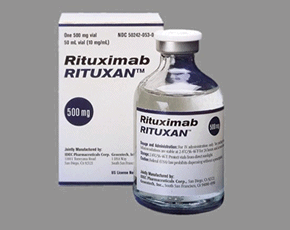The efficacy of rituximab, a monoclonal antibody directed against CD20 positive B cells, has been demonstrated for the treatment of rheumatoid arthritis (RA) in a number of key studies. However, not all patients respond to therapy. Whether patients with initial non-response may benefit from follow-up treatments (i.e. initial treatment resistance) has not been investigated. Here, Thurlings et al (Arthritis Rheum 2008; 58 (12): 3657) report response rates for initial non-responders who received subsequent infusions of rituximab compared to those who responded to their first treatment course.
Methods
Patients with seropositive RA and active disease despite methotrexate therapy were treated with rituximab (1000 mg separated by 2 weeks). After at least 6 months, all patients received a second treatment course if their DAS28 was > 3.2 (moderate disease activity or higher). Responses after each treatment course were compared for the groups defined by initial clinical response (initial responder vs. initial non-responder).
Results
A total of 30 patients received a first treatment course. Most (80%) were female with a median age of 55 years. Most had established disease, with a median disease duration of 12 years at enrollment. All had evidence of erosive disease on radiographs. The mean DAS28 on presentation was 6.5. The median methotrexate dosage was 15 mg/week and the majority (70%) was receiving low dose prednisone.
Among the 30 patient treated, 22 were categorized as initial responders and 8 as non-responders. Of the 22 initial responders, 17 received a 2nd treatment course and 14 were noted to respond. Of the 8 initial non-responders, 7 received a 2nd treatment course and none were noted to respond.
Among the 17 initial responders who received a 2nd treatment, 12 received a 3rd treatment course. Among these, all had at least a EULAR moderate or good response. The remaining 4 patients who received a 2nd treatment course were not retreated due to sustained low disease activity. Of the 7 initial non-responders who received a 2nd treatment course, 4 received a 3rd treatment. Of these, 1 achieved a EULAR moderate response, but none achieved a EULAR good response.
Conclusions
RA patients who do not respond to their first treatment course of rituximab will not benefit from subsequent treatments, while most that benefit from the first treatment course will have a sustained response with retreatment.
Editorial Comment
Although this is a small study, the striking differences between the groups provide convincing evidence that retreatment of initial rituximab non-responders is futile. These findings are important for clinical practice, as the time required to retreat and follow for a response in an initial non-responder can be better served by initiating therapy with a different mechanism of action. In addition, these findings suggest that seropositive RA patients may fall into different subsets based on B cell pathogenesis.


